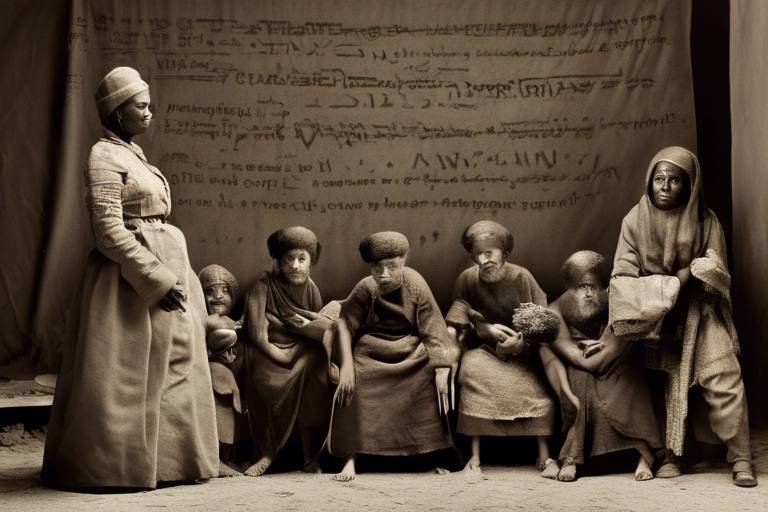The Impact of Globalization on Local Cultures
Globalization has become a powerful force shaping the world we live in today. It has brought about significant changes in how societies interact, trade, and communicate, leading to a complex web of interconnectedness that transcends traditional boundaries. As this global network expands, it inevitably influences local cultures in profound ways, impacting their customs, languages, and identities.
One of the key aspects of globalization is the phenomenon of cultural homogenization, where the dominance of global cultures overshadows local traditions, values, and practices. This can result in a loss of diversity and uniqueness as communities around the world start to adopt similar lifestyles and consumer patterns, blurring the lines between distinct cultural identities.
On the flip side, globalization also gives rise to cultural hybridization, a process where elements of different cultures blend together to create new forms of expression. This blending of traditions and practices challenges traditional boundaries, fostering cultural diversity and innovation as communities embrace new ideas and influences from across the globe.
However, the impact of globalization on local cultures is not always positive. Language shift and endangerment are common consequences, as dominant global languages gain prominence at the expense of indigenous and minority languages. This shift raises concerns about the preservation of linguistic diversity and the potential loss of unique cultural expressions embedded in these endangered languages.
Moreover, globalization can significantly alter traditional practices and rituals of local communities. Some traditions may adapt to align with global trends, while others face the risk of fading away as modernization and Western influences take precedence. This clash between preserving heritage and embracing modernity poses a challenge for communities striving to maintain their cultural roots in a rapidly changing world.
Another aspect to consider is the impact of tourism on local cultures. Globalization has facilitated the commodification of traditional practices and artifacts for commercial gain, raising questions about authenticity and cultural exploitation. The influx of tourists seeking authentic cultural experiences can sometimes lead to the distortion or commercialization of local traditions, blurring the line between genuine cultural exchange and commodification.
Despite these challenges, there are instances of resistance and cultural revival where communities actively strive to preserve and revitalize their traditions, languages, and identities. By asserting their cultural heritage in the face of external pressures, these communities demonstrate resilience and a strong commitment to safeguarding their unique identities in a globalized world.
Technological advancements, driven by globalization, have also played a crucial role in facilitating cultural exchange and interaction among diverse communities. The digital age has enabled new forms of artistic expression and collaboration, breaking down geographical barriers and creating opportunities for cross-cultural dialogue and creativity.
Looking ahead, the discussion on the impact of globalization on local cultures must also address the importance of policy implications and cultural sustainability. Governments and organizations need to develop strategies that strike a balance between the benefits of interconnectedness and the preservation of local cultural heritage. By implementing policies that support cultural sustainability, we can ensure that the rich tapestry of global cultures continues to thrive amidst the forces of globalization.

Cultural Homogenization
Cultural homogenization is a significant consequence of globalization, where local traditions, values, and practices face the risk of being overshadowed by dominant global cultures. Imagine a world where every corner you turn, you encounter the same fast food chains, fashion brands, and entertainment preferences. This phenomenon erodes the unique identities and diversity that once defined various communities, blurring the lines between distinct cultural expressions.
As globalization spreads its reach, the influence of Western ideals and consumerism permeates societies worldwide, creating a landscape where traditional customs struggle to compete with the allure of global trends. It's like a giant wave crashing onto the shores of local cultures, washing away the intricate tapestry of customs and beliefs that have been woven over centuries.
This shift towards cultural uniformity raises concerns about the preservation of heritage and the richness of human experience. Are we heading towards a world where every street looks the same, every language sounds familiar, and every celebration follows a standardized script? The challenge lies in striking a balance between embracing global connectivity and safeguarding the distinctiveness of local cultures.

Cultural Hybridization
Exploring how the interconnected world affects traditional customs, languages, and identities of communities worldwide, and the challenges and opportunities globalization presents for preserving and promoting local cultures.
Cultural hybridization is a fascinating phenomenon that arises from the intermingling of different cultures in the globalized world. It's like a vibrant tapestry where threads of various traditions, beliefs, and practices are intricately woven together to create a unique and diverse cultural fabric. This blending of cultural elements gives rise to new forms of expression, art, music, and even cuisine, enriching the global cultural landscape.
Imagine a musical composition where the melodious notes of a traditional instrument harmonize with modern beats, creating a mesmerizing fusion that captivates listeners from around the world. This fusion of cultural influences not only challenges traditional boundaries but also fosters creativity and innovation, leading to the emergence of hybrid cultural identities that are dynamic and ever-evolving.
Through cultural hybridization, communities have the opportunity to embrace diversity, celebrate differences, and engage in cross-cultural dialogue that transcends geographical borders. It encourages mutual understanding, respect, and appreciation for the richness of global cultural heritage, promoting a sense of unity in diversity that is essential in today's interconnected world.

Language Shift and Endangerment
Language shift and endangerment are significant consequences of globalization on local cultures. As dominant global languages spread and gain prominence, indigenous and minority languages face the risk of fading into obscurity. This shift poses a threat to the rich linguistic diversity that exists within communities worldwide. With the increasing use of global languages in various domains such as education, business, and media, the traditional languages of many cultures struggle to survive.
Communities often face challenges in passing down their native languages to younger generations, as the appeal and practicality of learning global languages become more prevalent. The decline of indigenous languages not only erodes cultural identities but also diminishes the unique perspectives and knowledge systems embedded within these languages. As a result, efforts to preserve and revitalize endangered languages become crucial in maintaining the cultural heritage and diversity of societies.
Globalization accelerates language endangerment through the homogenization of communication channels and the dominance of a few major languages in the digital sphere. The rapid spread of global media and technology further marginalizes minority languages, limiting their presence in the online world and reducing opportunities for linguistic revitalization. This shift towards a few dominant languages raises concerns about the loss of linguistic heritage and the potential homogenization of cultural expressions.
Efforts to address language endangerment include language revitalization programs, community language initiatives, and advocacy for multilingual education. By valuing and promoting linguistic diversity, communities can actively combat the threat of language shift and preserve their cultural identities. Embracing multilingualism not only safeguards endangered languages but also fosters intercultural understanding and appreciation.

Globalization and Traditional Practices
Globalization has a profound impact on traditional practices and rituals of local communities around the world. The interconnected nature of the modern world has brought both challenges and opportunities for these age-old customs. As globalization spreads, traditional practices are often influenced by global trends, leading to changes in how they are carried out and perceived by the community. In some cases, these practices may adapt and evolve to align with modern norms, while in others, they may face the risk of fading away as Western influences and modernization take over.

Tourism and Cultural Commodification
Tourism plays a significant role in the globalization of cultures, often leading to the commodification of local traditions and practices. As tourists seek authentic experiences, there is a growing demand for cultural artifacts, performances, and rituals, which can sometimes result in the commercialization of these elements. Local communities may alter their traditions to cater to tourist expectations, blurring the line between genuine cultural expression and staged performances. This phenomenon raises questions about the authenticity of cultural experiences and the ethical implications of profiting from traditional practices. Moreover, the commodification of culture can lead to the loss of its intrinsic value and meaning, reducing it to mere commodities for economic gain.

Resistance and Cultural Revival
Resistance to the homogenizing effects of globalization on local cultures is a powerful force that drives communities to preserve their unique traditions and identities. In the face of external pressures to conform to dominant global norms, many groups around the world are actively working to revive and reclaim their cultural heritage. This resistance takes various forms, from grassroots movements advocating for the protection of indigenous languages to the revitalization of traditional crafts and practices that were on the brink of extinction.
One example of cultural revival in the face of globalization is the resurgence of traditional music and dance forms in indigenous communities. By celebrating and promoting their cultural expressions, these communities not only reclaim their identity but also share their rich heritage with the world. Through festivals, workshops, and cultural exchanges, they create spaces for intercultural dialogue and mutual learning, fostering a sense of pride and belonging among their members.
Moreover, resistance to cultural commodification is another aspect of the fight for cultural revival. As globalization promotes the commercialization of local traditions for tourist consumption, many communities are asserting their rights to control and benefit from their cultural assets. By establishing fair trade practices, promoting ethical tourism, and engaging in cultural education initiatives, they seek to protect their heritage from exploitation and preserve its authenticity for future generations.
Ultimately, cultural revival in the face of globalization is a dynamic process that requires ongoing dedication and collaboration. By valuing and nurturing their unique cultural practices, languages, and beliefs, communities can not only resist the pressures of cultural homogenization but also thrive in a diverse and interconnected world. Through solidarity, creativity, and resilience, they pave the way for a more inclusive and sustainable global society where every culture has a place to flourish.

Technological Advancements and Cultural Exchange
Exploring how the interconnected world affects traditional customs, languages, and identities of communities worldwide, and the challenges and opportunities globalization presents for preserving and promoting local cultures.
Technology has revolutionized the way cultures interact and exchange ideas on a global scale. With the click of a button, individuals from different corners of the world can connect, share, and collaborate like never before. The internet, social media platforms, and digital communication tools have broken down barriers, allowing for a seamless exchange of cultural practices, beliefs, and art forms.
Through video calls, online forums, and virtual reality experiences, people can immerse themselves in diverse cultural environments without leaving their homes. This technological advancement has sparked a renaissance of cultural exchange, where creativity knows no bounds and innovation thrives through cross-cultural collaborations.
Furthermore, digital platforms have provided a stage for artists, musicians, and storytellers from various backgrounds to showcase their talents to a global audience. This exposure not only promotes cultural diversity but also fosters understanding and appreciation for the richness of different traditions and heritage.
As technology continues to evolve, the potential for cultural exchange grows exponentially. Virtual reality tours of historical sites, language translation apps, and online cultural workshops are just a few examples of how technology is shaping the future of cultural interaction. By embracing these advancements, communities can bridge gaps, celebrate diversity, and create a tapestry of shared experiences that transcend geographical boundaries.
Q: How does globalization impact the authenticity of local cultures?
A: Globalization can sometimes lead to the commodification and dilution of local cultures, as traditional practices are commercialized for mass consumption. However, communities are increasingly recognizing the importance of preserving their authenticity and are taking steps to safeguard their cultural heritage.
Q: What role do policies play in promoting cultural sustainability?
A: Policies and initiatives are crucial in balancing the benefits of globalization with the preservation of local cultures. Governments and organizations can implement measures to protect indigenous languages, support traditional artisans, and promote cultural education to ensure the sustainability of diverse cultural expressions.
Q: How can individuals contribute to cultural exchange in a globalized world?
A: Individuals can engage in cultural exchange by participating in multicultural events, supporting local artists and artisans, learning about different traditions, and advocating for the protection of cultural diversity. By being open-minded and respectful of other cultures, individuals can play a significant role in promoting cross-cultural understanding and appreciation.

Policy Implications and Cultural Sustainability
Policy implications play a crucial role in ensuring cultural sustainability in the face of globalization's impact on local traditions and identities. Governments and organizations need to develop policies that strike a delicate balance between embracing the benefits of global interconnectedness and safeguarding the unique cultural heritage of communities.
One key aspect of promoting cultural sustainability is through the implementation of cultural preservation programs that support the documentation, conservation, and transmission of traditional practices, languages, and customs to future generations. These initiatives help maintain the authenticity and richness of local cultures amidst the rapid changes brought about by globalization.
Furthermore, fostering intercultural dialogue and exchange is essential in promoting mutual understanding and respect among diverse communities. By encouraging collaborations and partnerships between different cultural groups, policies can facilitate the sharing of knowledge, traditions, and artistic expressions, contributing to a more harmonious global society.
Additionally, policymakers need to address the ethical implications of cultural interactions in a globalized world, particularly concerning issues of cultural appropriation, exploitation, and misrepresentation. Regulations and guidelines can help prevent the commodification of cultural practices for commercial purposes and ensure that local communities retain control over their heritage.
Moreover, education plays a vital role in promoting cultural sustainability by raising awareness about the importance of preserving diverse cultural identities and fostering a sense of pride and belonging among community members. Integrating cultural heritage into school curricula and promoting cultural events can help instill a sense of cultural identity and heritage preservation.
In conclusion, policy implications are instrumental in shaping the future of cultural sustainability in a globalized world. By implementing thoughtful and comprehensive policies that prioritize the preservation and promotion of local cultures, societies can navigate the challenges of globalization while celebrating the richness and diversity of human heritage.
Frequently Asked Questions
- What is cultural homogenization?
Cultural homogenization is the process where local traditions, values, and practices are overshadowed by dominant global cultures due to globalization, leading to a loss of diversity and uniqueness.
- How does globalization impact language shift and endangerment?
Globalization influences languages by causing the decline of indigenous and minority languages as dominant global languages become more prevalent, raising concerns about language preservation and diversity.
- What is cultural hybridization?
Cultural hybridization is the blending of elements from different cultures as a result of globalization, creating new forms of expression that challenge traditional boundaries and foster cultural diversity.
- How does tourism affect local cultures in the context of globalization?
Globalization promotes the commodification of traditional practices and artifacts for commercial gain through tourism, raising questions about authenticity and cultural exploitation.
- Why is cultural sustainability important in a globalized world?
Cultural sustainability is crucial in balancing the benefits of interconnectedness with the preservation of local cultural heritage, requiring policies and initiatives to promote and protect diverse cultural identities.



















